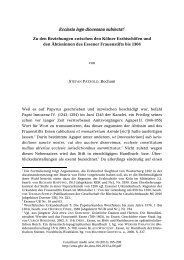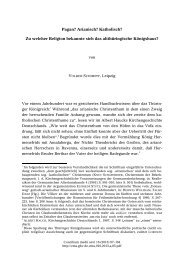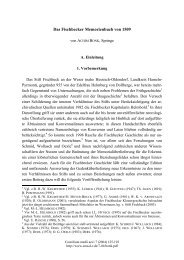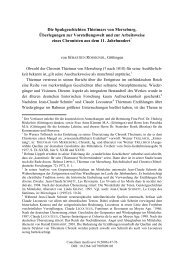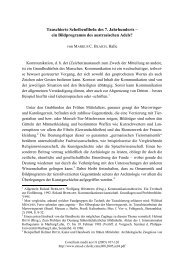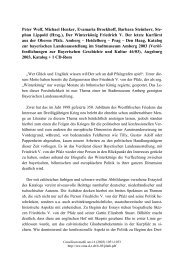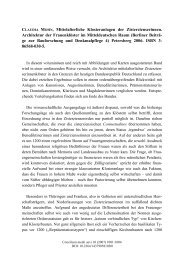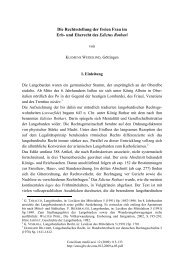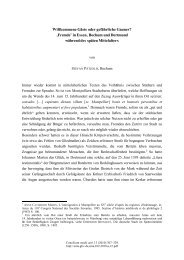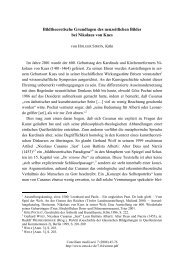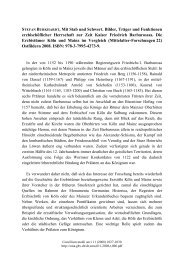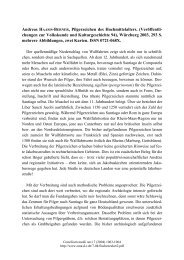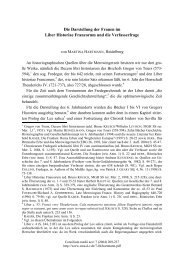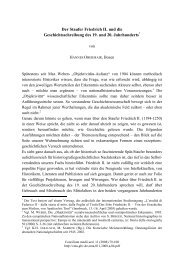Rabanus Maurus - Concilium medii aevi
Rabanus Maurus - Concilium medii aevi
Rabanus Maurus - Concilium medii aevi
You also want an ePaper? Increase the reach of your titles
YUMPU automatically turns print PDFs into web optimized ePapers that Google loves.
18<br />
FEE-ALEXANDRA HAASE: Rhetoric as praise of the emperor<br />
Dialectica is the science of the good dispute. We have a dispute by the use of words.<br />
Words are either single or conjunct. Single ones are those, which signify one thing like<br />
when we say ‘man horse dispute run’. If is not a wonder that ‘dispute’, although it is<br />
composed out of two, is considered as a simple one, because the thing is illustrated by<br />
the definition. Dialectica is the acute disputation to divide the true from the false.<br />
Rhetorica is the discipline to choose what is appropriate for persuasion.<br />
Rhabanus definies dialectica and rhetorica:<br />
Dialectica est disputatio acuta uerum distinguens a falso. Rhetorica est disciplina<br />
ad persuadendum quodque idonea. 31<br />
While rhetoric is the art of disputation on practical matters, dialectic is the art of<br />
disputation on theoretical matters. The concept under which Rhabanus re-organised<br />
the human science on the one hand by the exchange of a hierarchical system between<br />
philosophy and the artes liberales and the artes mechanicae, which dominated later<br />
Renaissance culture. Rhabanus put together instead of this sciences of philosophy,<br />
artes liberales and artes mechanicae. Although Rhrabanus provides his readers with<br />
some ‘secular’ or ‘worldly’ learning, you will see that in these paragraphs about the<br />
world itself Rhabanus is always revolving within the boundaries of learning<br />
determined by the Biblical text and, perhaps even more important, the ritual language<br />
of the Catholic Church itself, which was Latin. By the 8 th century, Jerome's Vulgate<br />
translation of the Bible had become universally adopted throughout Western Europe.<br />
Yet when it comes to the Psalms, you will find that the citations of the Psalms in<br />
Rhabanus’ work often do match the Vulgate. 32<br />
In 822 Rhabanus was elected for the position as an abbot. During his reign the<br />
monastery enjoyed its greatest prosperity. Rhabanus completed the new buildings that<br />
had been begun by his predecessor. Rhabanus erected more than thirty churches and<br />
oratories. Rhabanus was buried in the monastery of St. Alban at Mainz, but<br />
Archbishop Albrecht of Brandenburg transferred his relics to Halle. Rhabanus was<br />
probably the most learned man of his age. In Scriptural and patristic knowledge he had<br />
31 Rhabanus <strong>Maurus</strong>: De rerum naturis. Book 15: http://www.mun.ca/rabanus/drn/15.html. [7.7.2004]<br />
32 Cf. for the reception of the artes liberales: F. DECHANT, Die theologische Rezeption der artes<br />
liberales und die Entwicklung des Philosophiebegriffs in theologischen Programmschriften des<br />
Mittelalters von Alcuin bis Bonaventura. 1993.



